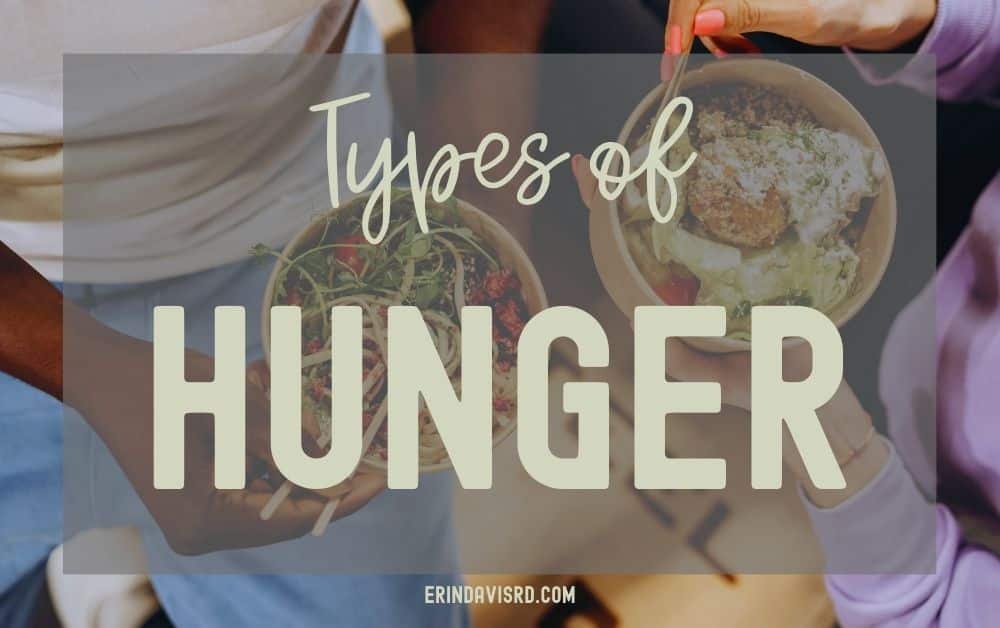Eating should be simple, right? Eat when hungry, and stop when full. But is there more to hunger than just a simple stomach growl? Today, I’m reviewing the different types of hunger, and why it’s important to honor your hunger cues.
Our bodies are designed to be hungry when we have the biological need for food. Not only do we have physical hunger, but we have psychological reasons for eating too.
That hunger is there for a reason. Yet we ignore the cues. Dieting complicates things.
We struggle to honor our hunger and trust our bodies. When we diet, our eating shifts from being internally driven to externally driven.
Restrictive eating makes you take cues from outside your body to guide your eating. You may be painstakingly looking to the clock, calories, portion size, carbs, peers, media, etc., to tell you when and what to eat.
If you’re new here, welcome! I’m Erin, an anti-diet dietitian specializing in diabetes. For years I’ve worked with clients to manage their health conditions WITHOUT extreme dieting.
My blog posts often cover different aspects of intuitive eating (IE), like weight gain, what to expect before and after IE, and meal planning for IE.
Part of the journey to healing your relationship with food includes honoring your hunger. You relearn your hunger cues and determine why you want to eat.
In this post, I’ll explain what the different types of hunger are and the benefits of acknowledging your hunger.
Let’s jump in!
Types of hunger
It may be a little easier to honor your hunger if you only had physical hunger. But we crave food for several reasons.
Here are some types of hunger:
Physical hunger

Physical means it is coming from your body. Here are the different types of physical hunger:
Biological hunger
Biological hunger is the basic need for nutrients and energy to sustain the body’s normal functions. This type of hunger is driven by the body’s internal signals, such as low blood sugar levels and an empty stomach.
Secondary hunger
Craving something specific? This type of hunger is associated with the desire for certain foods or flavors—possibly related to nutrient needs. For instance, craving red meat for your iron needs during your period.
Psychological hunger

This hunger originates from the brain rather than from physical needs and includes:
Emotional hunger
Most of us are familiar with this one. Emotional eating occurs in response to emotions such as stress, sadness, boredom, or happiness.
It’s not driven by the body’s physiological need for food but rather by the desire to cope with or enhance certain emotional states.
Are you polishing off a pint of ice cream when you feel stressed? “Treating yourself” to a pan of brownies because you got an A on your exam?
These are prime examples of emotional eating. And dieters are more likely to do it.
Cognitive hunger
You see that burger commercial and all of a sudden, you can’t go without a burger. Cognitive hunger occurs when thoughts, memories, or environmental cues trigger a desire to eat, regardless of physical need.
This can be influenced by factors like social situations, food advertising, or cultural associations.
Hedonic hunger:
Hedonic hunger is all about pleasure rather than necessity. This can involve consuming foods that provide sensory satisfaction, such as those high in sugar, fat, or salt.
Women and those who are inactive experience more hedonic hunger than men and those who are physically active. It’s also no surprise that dieters have more food cravings.
Environmental hunger

Our environment plays a role in our hunger, such as in:
- Situational hunger: You weren’t hungry, but all of your friends were eating, so you wanted to eat, too. Situational hunger is influenced by external factors such as the availability of food, cultural practices, and social settings.
- Temporal hunger: Do you experience hunger like clockwork? Temporal hunger occurs at specific times of the day or in response to daily routines. People may feel hungry simply because it is a customary time for a meal, even if their body’s physical hunger signals aren’t there.
Habitual hunger

Habits are behaviors that become automatic due to repetition. Your desire to eat may be habit-related.
- Habit-driven hunger: Do you always have popcorn when you watch a movie? Eat a snack on road trips? Developed through routines and habits, habit-driven hunger can occur at specific times of the day or in certain situations, even if the body does not necessarily need food.
Appetite vs hunger

So how does appetite compare to hunger? Hunger is the body’s natural response to a need for nutrients, while appetite is the psychological desire to eat often influenced by external factors.
Essentially, our hunger tells us when, our appetite tells us what.
While hunger is primarily a physical response, appetite involves the sensory and emotional aspects of eating.
Both play crucial roles in regulating food intake, and a balance between the two is essential for maintaining a healthy relationship with food.
Our appetites can be conditioned to crave certain foods. Long-term exposure to certain foods, like french fries or soda, can rewire the way our brains react to food.
The good news is that you can train your brain to crave nourishing foods to fuel your body for action.
How to respond to physical hunger

Eat! Please don’t ignore your physical hunger. I talked previously about the likelihood of binging after fasting. There’s a good chance if you ignore your hunger all day, you will eat ALL.THE.THINGS when you finally cave.
How often do you make yourself wait to eat? Do you ever push past that initial hunger? Maybe until you’ve earned it, or until it is a certain time on the clock?
When we delay our food intake, the reward is heightened when we finally succumb. That means it tastes better, we want more, we eat with a greater sense of urgency, and ignore our fullness.
Attempts to lose weight often fail. One reason for that is hunger. Because of our inherent desire to survive, we do not like to feel hungry, especially all day.
What happens when you ignore your hunger

Many people find that they can follow their diet plan all day but can’t control their eating in the evening or after work.
When we have gone without eating, our body will tell us to get food, and quickly. There is no time for that kale salad!
Our blood sugars have dipped, and we want the quick, easy carbohydrates we can use to boost our blood sugar and get us back to normal.
As a result, the cycle repeats. Restricting, overeating, feelings of guilt, restricting, etc.
This vicious cycle can be consuming. We become mentally drained and instead of living life to the fullest, we are funneling our energy on the next up-and-coming diet.
Ignoring hunger, or delayed eating isn’t effective at promoting long-term weight loss. So why make yourself miserable?
Not only are you setting yourself up for a binge eating episode, but when you lack trust in your body and its cues, you may be more likely to develop anorexia.
It’s okay to eat when you aren’t hungry

Yes, it’s ideal to eat when you’re physically hungry, but there are times when you’ll eat according to other types of hunger.
It’s okay to enjoy popcorn with your movie, pizza on game night, or a cupcake to celebrate a coworker’s birthday when you aren’t really hungry.
Food connects us to others. It’s a part of our traditions and culture.
However, you want to evaluate if this is something you are doing all of the time. It may be a habit that just needs rewiring.
Ultimately, you want to be in a place where you eat nourishing foods when you’re hungry, stop when you’re full, and enjoy the foods you love.
That can take time, especially if you’ve spent years ignoring hunger or regularly eating for emotional coping.
4 tips to honor your hunger

Are you convinced you need to listen to your body and honor your hunger? Here are some tips to do just that:
Recognize your hunger cues

First, figure out where in your body you experience hunger. What does it feel like? Do you feel it in your stomach? Do you feel a little shaky? Irritable?
When you feel physical hunger, do you feel guilty, or is it simply a cue to eat? These are all things you work through when you are becoming an intuitive eater.
Determine your hunger level

Decide whether you are meal-hungry or snack-hungry. There is no award for eating the smallest amount of food.
Eat according to what your body needs.
Under-eating can lead to a sense that you are never full, and constantly seeking food. If you feel obsessed with food, it’s possible that you need to eat a little more.
Throw out diet rules

When you eat according to external cues, like the time or diet plan allowance, you are not truly honoring your body’s signs of hunger.
Don’t pay attention to the clock or calorie count, but eat when your body feels those hunger cues. It is normal to be hungry every 2-3 hours.
Eat without distraction

Have you ever eaten in front of the TV or computer? Scrolling on Instagram or Pinterest? I’m certainly guilty of distracted eating. But when we are distracted, it’s hard to tell when we are eating mindlessly or according to actual hunger.
End the meal or snack with a sense of satisfaction. You want to feel satisfied. If you take the time to eat mindfully and eat the foods you enjoy, you can achieve that satisfaction.
Are you ready to stop the cycle of restriction, overeating, and guilt? You are not alone. I can help you learn to eat according to your hunger and heal your relationship with food. Book a discovery call to see if my services are right for you.
References
- Şarahman Kahraman C, Akçil Ok M. Hedonic hunger status and related factors in adults. Perspect Psychiatr Care. 2022;58(4):2099-2106. doi:10.1111/ppc.13036
- Busetto L, Bettini S, Makaronidis J, Roberts CA, Halford JCG, Batterham RL. Mechanisms of weight regain. Eur J Intern Med. 2021;93:3-7. doi:10.1016/j.ejim.2021.01.002
- Allison KC, Hopkins CM, Ruggieri M, et al. Prolonged, Controlled Daytime versus Delayed Eating Impacts Weight and Metabolism [published correction appears in Curr Biol. 2021 Feb 22;31(4):908]. Curr Biol. 2021;31(3):650-657.e3. doi:10.1016/j.cub.2020.10.092
- Phillipou A, Rossell SL, Castle DJ, Gurvich C. Interoceptive awareness in anorexia nervosa. J Psychiatr Res. 2022;148:84-87. doi:10.1016/j.jpsychires.2022.01.051
- Alcantara IC, Tapia APM, Aponte Y, Krashes MJ. Acts of appetite: neural circuits governing the appetitive, consummatory, and terminating phases of feeding. Nat Metab. 2022;4(7):836-847. doi:10.1038/s42255-022-00611-y
About the author
Erin is a registered dietitian and diabetes educator with almost 20 years of experience. She specializes in weight-inclusive diabetes care and prevention, intuitive eating, fitness, and women’s health. She works as a consultant and writer in the health and wellness space. Erin is passionate about empowering people to manage their own health and to have peace with food.


